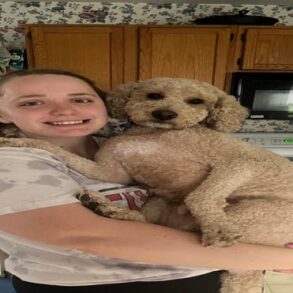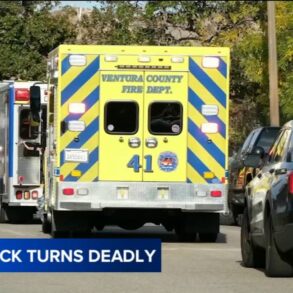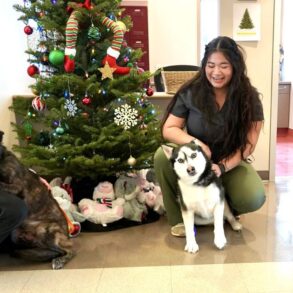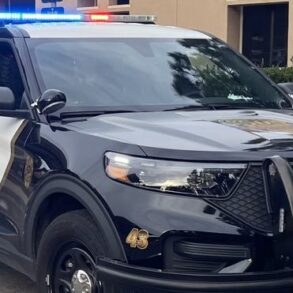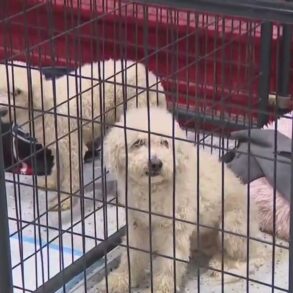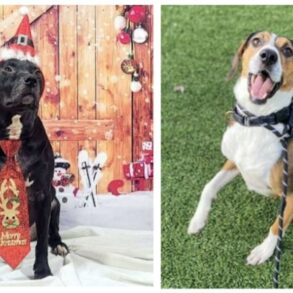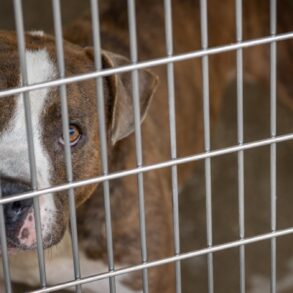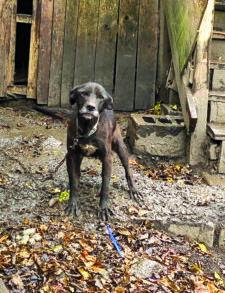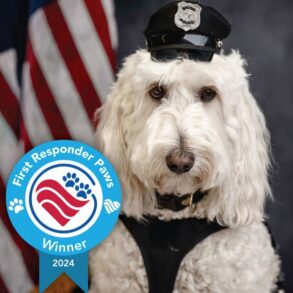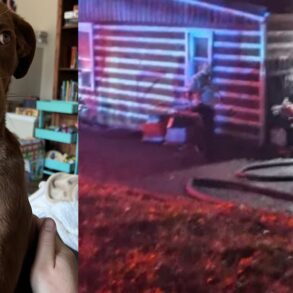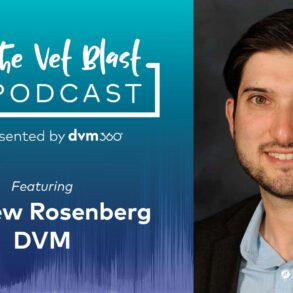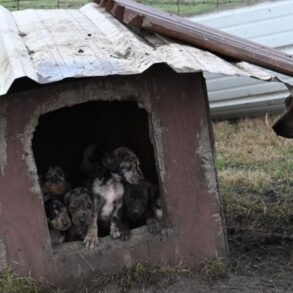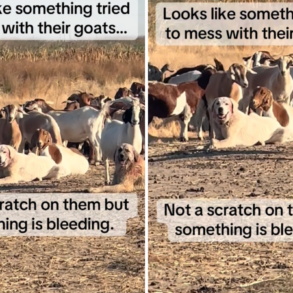Speaker 1(00:00):
I am joined in studio by one of my very favorites.
His name is Noodle and he is an awesome service
dog for another person.
Speaker 2 (00:13):
Who favorite I don’t know, Chris Boyer. Sorry, Chris, I’m
used to it. It’s okay, Sorry, Chris.
Speaker 1 (00:21):
Chris served in the US Marines and is now veteran
service coordinator for Freedom Service Dogs, which is a fabulous
organization that I have donated money to in the past,
before Chris was ever there, before I knew anybody was there.
And Chris and I met up for beer the other
day and he was telling me some of this fantastic
stuff that he’s doing with Freedom Service Dogs and also
(00:43):
some of the help that they could use, and of
course money is always appreciated.
Speaker 2 (00:50):
But that wasn’t the main thing we talked about.
Speaker 1 (00:52):
So I thought it would be cool to have Chris
here and talk about what they’re doing and how you
might be able to help in a way that you
might really enjoy. So, with that long introduction, Chris, thanks
for being here, glad.
Speaker 2 (01:02):
To be here, Ross, thank you.
Speaker 3 (01:03):
And I’m used to people wanting to see always looking
forward to see Noodle more than looking forward to see me.
So that’s commonplace, So tell.
Speaker 1 (01:16):
Us about what, Well, let’s just not assume people even
know what Freedom Service Dogs is, so let’s start with that.
Speaker 3 (01:21):
So, yeah, Freedom Service Dogs. We’re a five oh one
c three nonprofit. We raise our own dogs and we
train them to be service dogs, and primarily service dogs
for veterans with PTSD. We provide service dogs at no
cost whatsoever to the veterans.
Speaker 2 (01:40):
And really, if you were to.
Speaker 3 (01:44):
I think it’s probably fair to say too that you know,
we work really, really, really very hard and have a
very comprehensive program. Our staff is absolutely amazing.
Speaker 2 (01:53):
We’re local.
Speaker 3 (01:54):
We’re located in Inglewood, Colorado, not far off of I
twenty five and Arapaho Road, and I think it’s fair
to say that with the hard work and training that
we put into it, are amazing, amazing staff across the board.
Speaker 2 (02:08):
You could probably say that we are the.
Speaker 3 (02:10):
Gold standard in the region when it comes.
Speaker 2 (02:12):
To service dogs.
Speaker 3 (02:13):
These dogs are amazing and they they absolutely change lives.
Speaker 1 (02:19):
All right, So let me let me jump in here,
and we got like four or five minutes, so give
me sort of quick answers. I’ve been around plenty of
veterans with service dogs, including you becoming my.
Speaker 2 (02:30):
Friend and sing Noodle a lot.
Speaker 1 (02:31):
But for people who haven’t, just give us just briefly,
what does a service dog mean to that vet?
Speaker 3 (02:39):
It means that it opens back up their life. So
one of the big things with veterans of PTSD is
that they have a tendency to isolate, you know, due
to anxiety, depression and social anxiety. So they have a
tendency to isolate in their own homes, which is very
easy to do in today’s society where you can get
literally everything delivered and work from home. So they miss
(03:00):
out on everyday life and you know, even their kids’ lives,
you know, baseball games and school functions and activities. And
what these dogs do, one of the greatest things that
they do is they open up the lives of these
veterans so that they can engage in life again and
begin to experience what a normal life is and re engage.
(03:23):
And it’s a pretty amazing thing to watch.
Speaker 1 (03:25):
So I want to just now take a couple of
minutes about how my listeners might be able to help.
And of course, financial contributions always are are welcome, and
I am a donor freedom Service Dogs dot org. But
you were talking about some certain kinds of volunteering that
I thought was fascinating and maybe you can tell my
listeners and maybe we can help some folks. Maybe we
(03:46):
can find some folks who want to join in.
Speaker 3 (03:48):
Sure, absolutely, and as a nonprofit, I mean without our
amazing volunteers, you know, we wouldn’t be able to operate.
So you know, for one being that we raise our
own dogs. Puppy raisers are critical to our mission. And
you know that’s where there’s families that really they raise
our puppies up until they’re about the age of one.
(04:11):
And the hardest part, frankly, is given give it off back,
you know, to when where you know, they’re handed over
to our trainers and these dogs are getting ready to
become full on service dogs. You know, there’s also folks
you know, we we we try to give these dogs
as much of a fun and normal life as as
(04:31):
possible when they’re not in training. So families that can
foster dogs, So we try to get all these dogs
out of the kennels on the weekend. So foster families,
you know, if you’d like to, you know, take a
dog home for the weekend, or rent a dog for
free and just give it a you know, just a fun,
normal dog life. You know, we need those too, and
(04:51):
then all the way down to just volunteers that will
help out with you know, regular stuff around the kennels,
you know, walking dogs or hanging out with dogs and
give them some love.
Speaker 1 (05:01):
So the puppy raising part, how, if at all, is
raising a puppy who is bound to be a service
dog different from raising a puppy who is bound to
be your pet.
Speaker 2 (05:15):
Well, that’s a very good question.
Speaker 3 (05:16):
So our puppy raisers go through some dog training courses
so that they know enough to be dangerous as far
as being dog trainers, and you know, they they they
train the dogs through the process. Of course, there are
still allowed to be puppies and everything. But when our
(05:37):
puppies are about eight weeks old or so, they go
to boot camp. So there’s a couple of prisons, one
men’s one women’s where they go to and inmates.
Speaker 1 (05:48):
Okay, I thought you were talking about print joke doggie prisons.
You’re talking about real prison.
Speaker 3 (05:52):
Yeah, real prison or inmates have them for eight weeks
and they learn all of the basins. Wow, And it’s
an incredible thing when you see these dogs, these puppies
come back from prison from boot camp. They are they
are more well behaved and better trained than most of
the pet dogs that you see out there, well behaved
(06:13):
pet dogs. It’s incredible. So so we you know, with
puppy raisers, our goal is that they maintain and then
grow off of that.
Speaker 1 (06:22):
So the puppy raiser would get the first time the
puppy raizer would get the puppy to raise is after
the puppy comes out of that boot camp. That’s correct,
So eight weeks there with the breeder somewhere right, then
they go to the boot camp and then they go
to the puppy raiser for the rest for about a year,
a little bit.
Speaker 2 (06:39):
Less than a year or something like that, right exactly.
Speaker 1 (06:41):
Wow, okay, And and the puppy raiser doesn’t pay you
when you don’t pay them.
Speaker 2 (06:48):
Correct.
Speaker 1 (06:49):
And then one more time real quick, because’re running a
little late on the puppy fostering part.
Speaker 2 (06:55):
Yes, tell us again.
Speaker 3 (06:57):
Now that works where that’s where you bring of our
dogs home for the weekend.
Speaker 2 (07:01):
We you know, get them out of the kennel.
Speaker 3 (07:03):
And that’s that’s not a training thing because they’re being
trained Monday through Friday pretty extensively. During the week. That’s
just to bring a dog home and let it be
a dog, let it have fun, let it run around.
If you have other dogs and cats and stuff like that,
that’s fine. We just want our dogs to get out
and have fun and you know, not be stressed out
from the training regimen.
Speaker 2 (07:23):
Can can you.
Speaker 1 (07:24):
Back on the puppy razor thing for a second? Can
you be a puppy raiser if you have another dog
at home?
Speaker 2 (07:29):
Yes? Absolutely? Well, all right.
Speaker 1 (07:32):
How can folks get in touch if they would like
to be a puppy.
Speaker 2 (07:36):
Raizor be a foster volunteer any other way?
Speaker 3 (07:39):
Although that is on our website Freedom Service Dogs dot org.
Chris Boyer served in the US Marines.
Speaker 1 (07:44):
He is now veteran Services coordinator for Freedom Service Dogs.
They are local Freedomservicedogs dot org.
Speaker 2 (07:51):
To learn more.
Speaker 1 (07:52):
I’m actually gonna talk with my older kid about possibly
doing being a puppy raiser. It is is eighteen old
enough to do it?
Speaker 2 (08:02):
Or you have to be twenty one? You think?
Speaker 3 (08:03):
I think eighteen is? I believe it’s fine?
Speaker 1 (08:06):
Okay, let me know because I might this might be
a great fit for one of my kids. We’ll do
all right, that’s Chris Boyer, Freedom Service Dogs dot org.
Speaker 2 (08:14):
All right, thank you, thank you, noodle
This post was originally published on this site be sure to check out more of their content.


